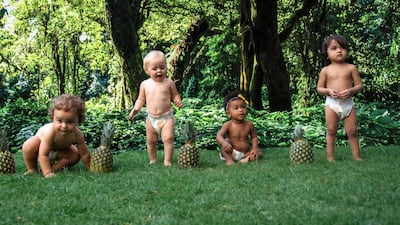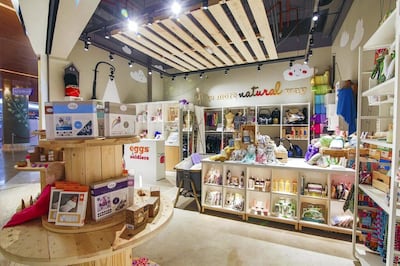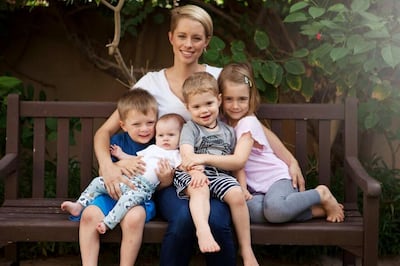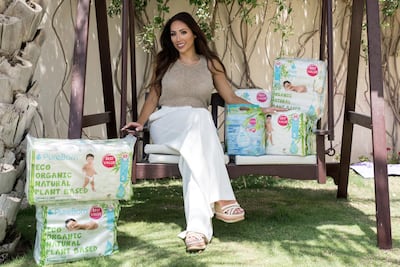Everyone wants what's best for their children, and in this day and age, that generally translates as the most natural and organic forms of nutrition and care. However, even this is seemingly no longer enough; the buzzwords in parenting these days also include "sustainable" and eco-friendly.
Today’s on-trend children’s products are good for your child and the planet, whether that’s organic clothing made along ethical guidelines from natural fibres, or toys handcrafted from recycled materials. Parents can bring about positive change through conscientious purchasing, while still obtaining the safest options for their young ones.
The healthier the product, the higher the price
However, the downside is obvious: generally, the “healthier” the product, the higher the price. But not always, says Sofi Chabowski, a British national who has lived her entire life in Dubai and last week opened an eco-focused baby store called Eggs & Soldiers in Dubai’s Time Square Centre. The concept is to offer a “more natural way” when it comes to parenting – today’s parents, discovered Chabowski, want to use the most ethical and chemical-free items, on and for their children, but who has the time to research these products and shop around for them?
Her store is the answer, and a higher price tag was never on the cards, she says. In fact, Chabowski’s own choice to go the natural, chemical-free route of cloth nappies for her children turned out to be the cheaper option. It also made sense to her because of the gentler environmental impact, as well as the peace of mind afforded from knowing she was using a chemical-free product on her children’s skin.
Chabowski, a mother of four children, ages 5 and under, didn’t like not knowing what was in the disposable nappies she was expected to use on her children. While pregnant with her first child, she did everything she could to find out what ingredients go into making nappies, and she got nowhere.
She did find out, however, that it takes between 200 and 500 years for disposable nappies to break down in landfills, and that it would cost her between Dh5,000 and Dh6,000 in nappies for just one child, from the minute they were born until they were toilet-trained. With four kids, that would translate to Dh20,000 just in nappies.
Going the cloth route meant that she has spent a total of Dh3,000 on nappies over the past five years for all four of her children. “People choose cloth diapering for one of three reasons: financial, environmental or chemical,” explains Chabowski, who used to hold educational demonstrations on cloth-nappy use during Baby Bazaar events held monthly in Dubai, and had a stand at the Dubai Garden Centre where she would sell cloth-nappy starter kits, before opening up Eggs & Soldiers.
Slowly, she began to branch out into providing gentle, chemical-free skincare products for babies, as well as cloth wipes, breastfeeding covers made from natural fibres, and the like. “There’s a much simpler way to do things that’s more natural, without being expensive and I wanted to share that with parents,” explains Chabowski. “Organic, while trendy, can be very expensive and misleading, and often equates to a substandard product, higher price tags and little more than clever marketing. We avoid those types of products. For example, we sell a tub of organic coconut oil for Dh39 that can last forever, and has multiple uses: as a moisturiser for you and baby, as a bath soap, as a skin protector. It’s natural, it’s simpler, and it’s cheaper.”
How to spend smarter
The trick is spending smart, says Chabowski. If there’s a supermarket brand that seems nice and cheap to you, but that you will end up buying lots of, then you might consider the organic, natural version that’s slightly more expensive, but will last much longer because you’ll likely need less of it. “The things our children come into contact with continually are the things that are important to me as a parent, and those are the things I’m careful about when purchasing,” she explains.
Mother of three Esraa Bani-Rothman, who runs MomsGuide in Abu Dhabi, agrees wholeheartedly. “I’m not ready to go the route of bubblegum pink Barbie shampoo from the grocery store, but at the same time I don’t want to spend [a fortune] for a tiny bottle of organic shampoo that my baby boy will spill in the bath,” says Bani-Rothman.
________________
Read more:
These books will help encourage mindfulness in your children
How to choose a child-friendly restaurant in the UAE
Teens in the UAE: parents share tips on how to keep their kids out of trouble
________________
Find the middle ground, she advises, and hunt for products that have safer ingredients and more reasonable prices. For her, that means organic cotton squares from the grocery store that she uses on her children, or an organic, chemical-free shampoo brand from Turkey that she found at Wheatfields and costs Dh25 per bottle.
“There are a lot of parents like me who don’t really believe in the high pricing of these so-called organic items but, at the same time, we are not willing to compromise our ideals, so we end up with less stuff or no stuff or engage in an ongoing hunt for the right stuff, at the right cost.”
One brand that Bani-Rothman says she is “ecstatic” about discovering is Pure Born nappies and wipes, which she says have cracked the code. “They have high-quality, organic, non-toxic products that are also affordable. When I compare them to other nappies, their price is slightly over the margin, but not significantly, so it’s justified because it’s healthier for both my baby and for the environment. It’s not the boutique rubber duckie that costs Dh200 at a fancy ‘ethical’ store, but Dh5 at the equivalent of a dollar store,” she says.
Pure Born nappies and wipes – available across the UAE at Carrefour, Lulu Hypermarkets, Babyshop stores and online on Mumzworld.com – is a UAE-based company founded by Hannah Curran in November. Curran, a 26-year-old from England, wanted a high-quality, healthy, affordable alternative to the expensive organic products available to parents. Her products are made out of sustainable bamboo, without harming any trees, and are free of any chemicals or toxins. The wipes are 99 per cent water; the only other ingredients are tea tree oil and coconut preservative.
“By using our bamboo products for a typical child’s two-year term in nappies, we can help save four trees,” explains Curran. Pure Born also donates 5 per cent of its proceeds to Dubai Cares. “We truly believe every company has a responsibility to give back, especially in parenting products. It really adds to the motivation to get up each morning, knowing that you can make a difference to your child’s world of tomorrow.”
Pure Born has a solid market, she says, because parents will always want the best for their children, especially if it’s affordable, of good quality and simply makes sense. A pack of 60 wipes is Dh18; packs of nappies start at Dh35 depending on size, for approximately 22 nappies.
What matters to you?
It’s all a matter of picking and choosing what matters to you as a parent, says Chabowski. “Do I always buy clothing made of organic cotton? I’d love to, but it’s not sustainable for me as a parent. But cloth nappies made of organic cotton, considering that they are on my children’s bums 24 by 7? Absolutely.”
Eggs & Soldiers sells a cloth-diapering economy kit for Dh600, with nappies made out of organic cotton. The kit provides enough nappies to get you from the newborn stage to toilet-training, and the nappies come in different sizes. The cost is a big initial one upfront, but that’s all you’re ever going to have to pay for nappies; no more hidden costs in your weekly groceries as a parent, points out Chabowski.
Her store also stocks natural crib mattresses made of coconut and natural latex, with an all-natural wool coating, ranging in price from Dh1,000 to Dh1,500. “Something like that is certainly more expensive than a regular mattress, but because mattresses can contain a lot of chemicals and formaldehydes, the extra expense is worth it to some,” she explains.
Going the all-natural, ethically conscious and more sustainable route can be all-encompassing. You can opt for eco-friendly glass bottles over plastic ones; baby carriers made of natural fabrics; reusable silicone bags to house snacks and sandwiches, rather than disposable Ziploc ones; food-grade silicone necklaces for teething made from ethical materials; and even locally made products that automatically translate into a lower carbon footprint because they haven’t had to travel across the globe to make it to the consumer.
“It’s a choice you make,” reiterates Chabowski. “It’s not necessarily about choosing organic. It’s about being more naturally inclined in some ways, and smarter about conscious parenting. It’s making conscious decisions because you’ve thought it through and would rather do it this way, instead of doing it just because you think that’s how it’s always been done.”




